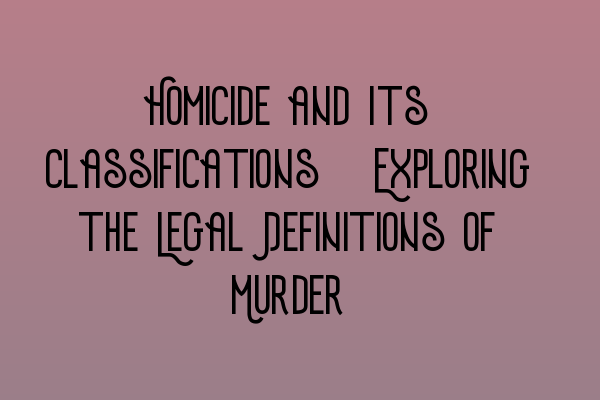Homicide and Its Classifications: Exploring the Legal Definitions of Murder
When it comes to criminal law, the term “homicide” refers to the act of taking another person’s life unlawfully. However, not all homicides are considered murder. The law recognizes different classifications for homicide, each carrying its own legal consequences. In this article, we will delve into the various definitions of murder, shedding light on the distinctions that exist within this complex area of criminal law.
First-Degree Murder
First-degree murder is the most severe category of murder. It involves a premeditated and intentional killing that is committed with malice aforethought. This means that the perpetrator planned the murder in advance and carried it out with a clear intent to cause the victim’s death. First-degree murder is considered the most heinous crime and carries harsh penalties, often including life imprisonment or even the death penalty in some jurisdictions. To understand the nuances and legal elements of first-degree murder, refer to our related article on SQE 1 Practice Exam Questions.
Second-Degree Murder
Second-degree murder is a lower level of homicide compared to first-degree murder. Unlike first-degree murder, it doesn’t require premeditation or a specific intent to kill. Instead, it involves an intentional killing without premeditation. Second-degree murder generally occurs in the heat of the moment or as a result of reckless behavior. While second-degree murder is still a serious offense, it carries lesser penalties compared to first-degree murder. For more information on the legal aspects of second-degree murder, explore our comprehensive guide on SQE 1 Practice Mocks FLK1 FLK2.
Voluntary Manslaughter
Voluntary manslaughter is a homicide category that arises from a sudden and intense emotional response. It occurs when the perpetrator kills another person in the heat of passion, usually provoked by strong emotions such as rage, fear, or jealousy. Although voluntary manslaughter is a criminal offense, it is often considered a lesser charge than murder due to the presence of immediate provocation. The penalties for voluntary manslaughter are less severe than those for murder. For a detailed analysis of voluntary manslaughter, refer to our in-depth article on SQE 2 Preparation Courses.
Involuntary Manslaughter
Involuntary manslaughter occurs when a person causes another person’s death through negligent or reckless behavior but without any intent to kill. This category of homicide includes cases where the perpetrator’s actions, such as drunk driving or failing to properly maintain equipment, directly result in the loss of life. Involuntary manslaughter is considered a less serious offense than murder or voluntary manslaughter, and the penalties vary depending on the jurisdiction. To learn more about the legal implications of involuntary manslaughter, consult our comprehensive guide on SQE 1 Preparation Courses.
Understanding the classifications of homicide is crucial for legal professionals involved in criminal law cases. Each category carries its own specific legal elements and penalties, which must be thoroughly understood to ensure a fair and just legal process. If you are studying for the SQE exams or working in the criminal law field, make sure to stay updated with the latest information and legal developments.
For exam dates and important deadlines, visit our page on SRA SQE Exam Dates. Stay ahead in your preparation journey by utilizing our valuable resources, such as SQE 1 Preparation Courses and SQE 2 Preparation Courses to enhance your knowledge and skills.
